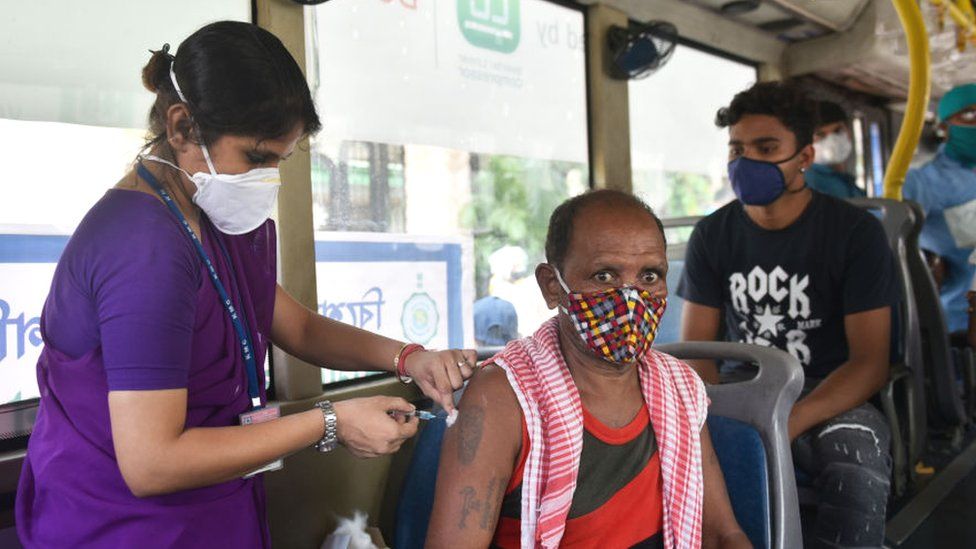 Indian Prime Minister Narendra Modi has said that all adults in India will now get free vaccines.
Indian Prime Minister Narendra Modi has said that all adults in India will now get free vaccines.
Indian Prime Minister Narendra Modi has said that all adults in India will now get free vaccines.
"It has been decided that from 21 June, all adults over the age of 18 will be vaccinated [for] free," Mr Modi said.
"Whether it is the poor, the lower middle class, the middle class, or the upper middle class, under the central government programme, everyone will get free vaccines," Mr Modi said.
But what does this mean for vaccination strategy in India, which has struggled with a severe second wave of coronavirus?
Prime Minister Modi's announcement came in a national address on TV, in which he talked about the history and logistics of vaccine programmes in India.
Responsibility for vaccinations in India has historically been shared between the federal government in Delhi and state governments.
Under the earlier Covid vaccine policy, half of all vaccines produced in India went to the federal government, and the rest went to state administrations and private hospitals.
But now the federal government will buy 75% of all vaccines manufactured.
The state governments will receive their vaccines doses for free from the federal government, instead of negotiating directly with manufacturers.
However, it's worth noting that the remaining 25% of vaccines are still set aside for procurement by private hospitals as before.
These vaccinations are not free - people have to pay at private hospitals.
The federal government has fixed prices for the three approved vaccines at 780 rupees ($10.7; £7.5) for Covishield, 1,145 rupees ($15.7; £11) for Sputnik V, and 1,410 rupees ($19.3; £13.6) for Covaxin.
It means that state governments will now receive their allocated vaccine doses from the federal government based on the population of those states, the level of disease, vaccination progress and vaccine wastage.
That relieves the state authorities of having to purchase doses from the manufacturer at higher prices than were offered to the federal government.
It also hands more control over the vaccine rollout to Delhi.
The announcement also comes just days after the previous policy attracted criticism from India's top court, which called it "arbitrary" and "irrational".
It questioned the rationale behind making states pay more for vaccines than the federal government had to.
States had to procure them on the open market, and so the financial burden on some of the poorest states such as Bihar, Jharkhand and Uttar Pradesh significantly increased.
"This is a step in the right direction and will streamline some procurement-related challenges," says public policy and systems expert Dr Chandrakant Lahariya.
The new policy is in fact similar to what India did when it began its vaccine rollout in January this year.
This was even acknowledged by Mr Modi himself, who said "the old system, in place before 1 May, will be implemented again."
"This announcement doesn't change much for citizens," says Dr Lahariya.
The original policy was changed in April, when India was hit by a dramatic surge in case numbers and India's vaccine drive was faltering.
States were then allowed to bid for vaccines directly from manufacturers, which it was hoped would encourage other vaccine makers to enter the Indian market and boost supply.
But it didn't work out like that, and shortages of vaccines began to emerge in a number of places as supply couldn't keep up with demand.
We've looked in other pieces at the challenges that face Indian vaccine manufacturers in trying to ramp up production.
India has administered a total of nearly 235 million vaccine doses since January.
The vaccine drive picked up pace in early April, with 3.66 million doses administered on 10 April, the highest so far.
But that figure then fell by nearly half in mid-May and several states suspended vaccinations for the 18-44 age group due to shortages.
India's adult population is estimated as being over 900 million.
The Indian government has pledged to vaccinate all adults by the end of the year, a target many experts say would be difficult to meet at the current pace.
By Shruti Menon
BBC Reality Check